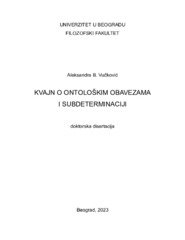Приказ основних података о документу
Kvаjn o ontološkim obаvezаmа i subdeterminаciji
Quine on ontological commitment and underdetermination
| dc.contributor.advisor | Zorić, Aleksandra | |
| dc.contributor.other | Jandrić, Andrej | |
| dc.contributor.other | Kostić, Jovana | |
| dc.contributor.other | Radovanović, Biljana | |
| dc.creator | Vučković, Аleksаndra | |
| dc.date.accessioned | 2023-11-22T10:03:34Z | |
| dc.date.accessioned | 2024-02-12T12:16:46Z | |
| dc.date.available | 2023-11-22T10:03:34Z | |
| dc.date.available | 2024-02-12T12:16:46Z | |
| dc.date.issued | 2024 | |
| dc.identifier.uri | https://uvidok.rcub.bg.ac.rs/handle/123456789/5567 | |
| dc.identifier.uri | http://reff.f.bg.ac.rs/handle/123456789/6183 | |
| dc.description.abstract | Filozofski fakultet | sr |
| dc.description.abstract | Cilj ovog istraživanja je kritička analiza Kvajnovog shvatanja ontoloških obaveza, prevashodno u kontekstu njegovih teza o apsolutnoj istini i subdeterminaciji. Koristeći se interpretativno-kritičkim metodom, nastojaćemo da pokažemo da je Kvajnovo fizikalističko određenje ontologije posledica njegovog usvajanja naturalizma, ali i holističkog pristupa problemima saznanja. Sledeći metod pojmovne analize, videćemo da Kvajn pojam „fizike” koristi na dva različita načina. Fizika je u užem smislu nauka o materiji, dok u širem smislu označava globalnu teoriju o spoljašnjem svetu. Analogno pojmu „fizike”, analiziraćemo uži i širi smisao koji Kvajn pripisuje pojmu „jezika”. Zastupaćemo tezu prema kojoj su jezik i fizika (shvaćena u užem smislu) ontološki paralelni i da oni, zajedno sa ostalim naučnim teorijama, čine globalnu teoriju koja tek u svojoj celini postaje nosilac ontoloških obaveza. Tvrdićemo da Kvajnovo tumačenje ontologije svoj potpuni oblik zadobija u njegovim poznijim radovima, gde uvodi tezu o apsolutnoj istini kojom se garantuje da ontološke obaveze globalne teorije neće biti međusobno protivrečne. Konzistentnost ontoloških obaveza globalne teorije biće dovedena u pitanje u kontekstu rasprave o istinosnom statusu teorija koje podležu subdeterminciji. Naime, Kvajn se dugo kolebao u pogledu toga da li su u ovim slučajevima obe teorije istinite (ekumenski odgovor zasnovan na empirizmu) ili samo jedna od njih (sektaški odgovor zasnovan na naturalizmu). Oslanjajući se na istorijski i interpretativno-kritički metod, kao i zaključak o globalnoj teoriji kao nosiocu apsolutne istine, tvrdićemo da naturalizam u pogledu ontologije ima prednost nad empirizmom i da samo jedna teorija može biti istinita, uprkos tome što su obe potkrepljene empirijskim svedočanstvom. | |
| dc.description.abstract | This research aims to critically analyze Quine's interpretation of ontological commitment, primarily in the context of his theses on absolute truth and underdetermination. Using the interpretative-critical method, we will try to show that Quine's physicalist rendition of ontology originates from his adoption of naturalism, along with his holistic approach to the knowledge problems. Following the method of conceptual analysis, we will see that Quine uses the term ‘physics’ in two different ways. In its narrow definition, physics is the science of matter, while in a broader sense, it represents a global theory about the external world. Analogous to the term 'physics', we shall analyze the narrow and broad sense that Quine attributes to the term 'language'. We shall uphold the thesis of ontological parallelism between language and physics (understood in its narrow sense) and claim that they, together with other scientific theories, form a global theory that only in its entirety becomes the reservoir of ontological commitment. We will argue that Quine's interpretation of ontology takes its final form in his later works, as he introduces the thesis of absolute truth, which guarantees that the ontological commitment of the global theory does not contain contradictions. The consistency in the global theory's ontological commitment will be challenged in the debate on the truth status of theories subject to underdetermination. Quine wavered for a long time as to whether, in these cases, both theories are true (an ecumenical response based on empiricism) or only one (a sectarian response based on naturalism). Relying on the historical and interpretive-critical method, as well as the judgment that the global theory is the bearer of absolute truth, we will argue that naturalism has an ontological precedence over empiricism and that only one theory can be true, despite both of them being supported by the empirical evidence. | |
| dc.language.iso | sr_lat | sr |
| dc.publisher | Univerzitet u Beogradu - Filozofski fakultet | sr |
| dc.subject | Kvajn | |
| dc.subject | ontologija | |
| dc.subject | subdeterminacija | |
| dc.subject | fizikalizam | |
| dc.subject | naturalizam | |
| dc.subject | empirizam | |
| dc.subject | istina | |
| dc.subject | naučne teorije | |
| dc.subject | holizam | |
| dc.subject | Quine | |
| dc.subject | ontology | |
| dc.subject | underdetermination | |
| dc.subject | physicalism | |
| dc.subject | naturalism | |
| dc.subject | empiricism | |
| dc.subject | truth | |
| dc.subject | scientific theories | |
| dc.subject | holism | |
| dc.title | Kvаjn o ontološkim obаvezаmа i subdeterminаciji | sr |
| dc.title | Quine on ontological commitment and underdetermination | |
| dc.type | doctoralThesis | en |
| dc.date.updated | 2030-04-23 | |
| dc.description.version | 1 | |
| dc.identifier.fulltext | http://reff.f.bg.ac.rs/bitstream/id/15754/Doktorat.pdf | |
| dc.identifier.fulltext | http://reff.f.bg.ac.rs/bitstream/id/15755/Referat.pdf | |
| dc.identifier.rcub | https://hdl.handle.net/21.15107/rcub_reff_6183 |


